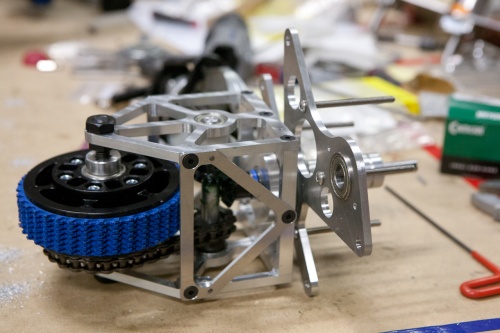Team 1640 2015 Summer CAD Certification
Introduction
The course we're doing this summer is based on a curriculum by Professor Randall Bock at Penn State Main Campus that aims to take SolidWorks novices from zero to Certified SolidWorks Associate. We'll also include some FRC skills that aren't on the CSWA, including sheet metal. This course meets 2pm-4pm on Saturdays except the Sundays of 28 June, 12 July, and 16 August. It's enrollment capped; please contact Clem McKown or Siri Maley.
The course instructor is Siri Maley, a Penn State mechanical and design engineering alumna and former teaching assistant for engineering design. She's is a Certified SolidWorks Professional (as well as a CSWA). Siri's SW Certifications
30 May 2015: First Class
Optional Placement Test: CSWA Practice Exam. Scroll through all the problems and pick the that's most difficult but doable for you. I'd recommend avoiding the first problem (the X Box) as it's dimensioned in the old isometric view that is no longer used on the test because it's unnecessarily difficult to read.
Pivot Cage: Model the pivot cage top plate using calipers. The download the cage and download two parts from McMaster-Carr: (A) 10-32 x 1/2" Black-Oxide Alloy Steel FHCS, and (B) 10-32 x 3/8" Black-Oxide Alloy Steel FHCS. The longer screws go through the thicker plates (the side plates). Does your cage fit together?

More on the CSWA Exam
Exam Details: The CSWA is a 3 hour computer-based exam. It includes 14 multiple choice and numerical answer questions that cover basic, intermediate, and advanced part modeling as well as assembly creation and basic drawing techniques. The minimum passing grade is 70%, and each question has no partial credit. You'll might use:
- Sketch entities & dimensions – lines, rectangles, circles, arcs, ellipses, centerlines
- Sketch tools (offset, convert, trim/extend) & relations (all)
- Boss and cut features – extrudes, revolves, sweeps, lofts
- Fillets and chamfers
- Linear, circular, and fill patterns
- Feature conditions – start and end
- Mass properties & materials
- Inserting & mating components - coincident, parallel, perpendicular, tangent, concentric, distance, angle
- Reference geometry – planes, axis, coordinate systems
- Drawing views & annotations
More Practice Problems:
- Basic Part Modeling
- Intermediate Part Modeling
- Advanced Part Modeling
- Integrated Part Modeling (different problem)
There's also a Certified SolidWorks Professional Exam, which covers slightly more material at a much lower time limit.